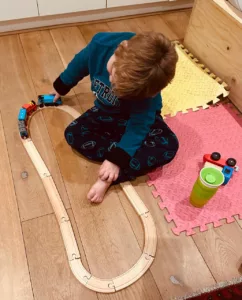The Greek myth goes that Sisyphus was condemned by Zeus to roll a massive boulder up a hill, only to have it roll to the bottom again once he got it to the top. Sisyphus had angered the gods with his hubris, cheating death, and causing a big kerfuffle. But it’s not his crime I relate to, it’s his punishment. Because I can’t think of a better metaphor for the hard days of autism.
Life right of centre on the spectrum, has its challenges. Profoundly impacted children struggle with a lot of very simple things. Things nobody would ever imagine would be hard for someone. I have so many examples of this, because my three year old son has a lot of sensory sensitivities, bad anxiety, and deeply-rooted control issues. Ritualistic behaviour and extreme rigidity sadly robs him of a lot of joys in life. Just this morning, he wanted to get outdoors and go for a car ride… but not everything in his immediate environment was exactly how he wanted it, his anxiety kicked in, and he just couldn’t get out of the front door. He was hijacked by his neurological operating system, and as much as he wanted to put on his shoes and go outside, he couldn’t complete the task. Not unless everything was the same as it was yesterday: front door already open, chair in a particular position, shoes in a particular spot, everyone going out with him already waiting with their belongings in the foyer, Dad with car keys already in-hand, and a cold sippy for the ride. Today our domestic lady wasn’t quite ready to leave yet, and so not standing by the door, and we’d forgotten to refill his sippy cup. When he realised that his routine was out of whack, he had an hour-long meltdown, with some looping at the end. Although Aidan is nonverbal and couldn’t tell me what he was thinking in that moment, I could see his frustration plain as day. I could see that his little heart was broken that he couldn’t get into the car, and he took a while to recover from the disappointment. His heart wanted to go, but his brain was in fight or flight mode and told him to stay. We are trying to model resilience for him, and depending on the virility of his dysregulation, we sometimes help him to calm down and then try the task again. But this morning, that just wasn’t possible. We had to engage him in play, and skip the ride completely.
It’s not just car rides of course. Every routine in his life must always be the same. If it’s not, he becomes dysregulated and can’t calm down or continue to function. We suspect OCD, but he’s not yet been diagnosed with it. When he goes into a meltdown, from the outside, he looks like a bratty kid who lacks parental discipline, throwing the mother of all tantrums to get his way. But meltdowns and tantrums are very different things. A tantrum is typical for a Threenager, and has a goal – “do this” or “don’t do that”, “want this” or “don’t want that”. A meltdown has no goal and is the result of a child becoming so overwhelmed, they’re not in control of their body or their emotions anymore. A parent could potentially discipline a child having a tantrum, but they can only redirect a child in full blown meltdown. The main reason being that a child in meltdown can’t adhere to instructions. Even if verbal, they can’t respond to you in that state or indicate what triggered them. They can only be escalated by your words and actions, or desecalated and redirected to a distraction of some kind. Because once a child starts to focus on a good distraction, their nervous system begins to calm down. The most important thing to remember is to calm your own! Because autistic kiddos have a sixth sense for your anxiety, no matter how hard you to try to hide it, and like an accelerant, it fuels their overwhelm.
It’s hard going having a child who has numerous triggers for meltdowns. Because even though one knows you shouldn’t, you start to live your life in a way that avoids triggers at all costs. Pure exhaustion prompts you to create an environment that is mentally tolerable and emotionally safe for your child. And that’s ok to an extent, because a child with a disability deserves to have accommodations made for them. But when it begins to affect your freedoms or safety, you have to start working on building tolerance around certain triggers. This is achieved most effectively by working incrementally with an occupational therapist.
Aidan’s rigidities are super “extra”. There’s a long list of ones that don’t change but… many of them do, and not in a good way. Despite him being nonverbal, we will troubleshoot adverse responses, reactions, and behaviours till we’re blue in the face, trying to figure out what it is he’s trying to communicate. This requires a level of patience and creative thinking I never thought I’d be capable of! The “me” of ten years ago, would never have coped with it. But I have three years of autism under my belt now. Nonetheless, frequently, just when you’ve got the multiple necessary steps in a routine down, Aidan will change one small detail in his mind and make it a non-spoken requirement. So, you’ll have a period of meltdowns at the front door, figure everything out through trial and error, have two good months with no issues, and suddenly be back to meltdowns in the foyer. It is a Sisyphus-level of frustration and exhaustion only another special needs parent could understand. We go through rough periods with behaviours, and sometimes every day feels like rolling a boulder up a hill in the depths of Hades. The good news is that with autism, where you’re standing is not where you’ll remain. Things can be worked through and overcome. It just takes time and patience.







